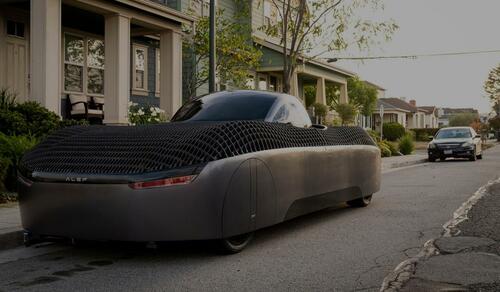
Authored by Felicity Bradstock via OilPrice.com,
-
Alef Aeronautics, based in San Mateo, California, has seen an impressive number of pre-orders for its two-seater eVTOL vehicle, Model A, with plans to develop a four-seater sedan, Model Z, by 2035.
-
The company has received a Special Airworthiness Certificate from the FAA for its Model A, highlighting its innovative design and potential for commercial viability in personal and urban mobility.
-
Competitors like Joby Aviation and Lilium are also advancing in the eVTOL market, focusing on flying taxis and partnerships to facilitate urban air mobility, indicating a growing industry trend towards airborne personal transport.
Pre-orders for a “flying car” have soared in recent months leading industry experts to question how close we are to small passenger vehicle flight. Alef Aeronautics, a company backed by Space-X, specialising in the production of flying cars, has achieved 2,850 pre-orders for its electric vertical take-off and landing (eVTOL) vehicle. The firm is backed by Tesla investor and venture capitalist Tim Draper, which has helped draw attention. Based in San Mateo, California, Alef Aeronautics is allowing customers to pre-order its two-seater flying car, the Alef Model A, online with a $150 deposit. Customers are allowed to withdraw the deposit at any time to cancel the pre-order.
The car is expected to be priced at around $300,000 when it becomes commercially available, which gives the company an order value of over $850 million to date. Jim Dukhovny, Alef’s CEO, stated: “As of today we have a little bit more than 2,850 pre-orders with deposits down, which makes it the bestselling aircraft in history, more than Boeing, Airbus, Joby Aviation and most of the eVTOLs combined.”
Alef is also developing a four-passenger sedan called the Model Z. It is expected to become commercially available for the much lower price of $35,000, by 2035. It is just one of many start-ups developing flying car technology, but, over the last year, it has been recognised for the significant progress it has made. Alef’s Model A looks like a futuristic car. They use a mesh shell to cover rotors, allowing air to flow through the car.
The company first unveiled a half-size model of the vehicle at the Mobile World Congress, catching the attention of consumers and automakers worldwide. Dukhovny believes the Model A will be the world’s first flying car, as most other vehicles under development resemble something similar to a jet or a drone, fitted with wings or rotors. The CEO explained, “I know that people have claimed the first flying car… But we always had the idea that it has to be a car, a physical car, a regular car, as you can see it’s an eVTOL, an electric car. a regular car, drive, park, look, everything as a car, and a vertical take-off.”
The aim is for the car to be capable of being driven on the road, similarly to an electric vehicle (EV), at speeds of between 25 and 35 mph, as well as used to fly in any direction using its eight propellers, where it will reach speeds of up to 110 mph. As it is expected to weigh just 850 pounds, it can be classed as a small EV, making it more likely that the regulatory bodies will approve the car for flight by as early as 2025.
While Alef gained greater fame following the Mobile World Congress, this is not the first we are hearing of the company. Alef initially started working on its concept car in 2015, producing the first prototype of the Model A in 2019. In July 2023, it was issued with a Special Airworthiness Certificate by the U.S. Federal Aviation Administration (FAA), which allowed the company to fly its Model A in limited locations for exhibition, research and development. The vehicle falls under the categorisation of Advanced Air Mobility (AAM), which is used for technology such as air taxis and VTOL aircraft.
However, several companies are hot on Alef’s tail, hoping to rapidly develop their own flying car technology for commercial release.
The eVTOL producer Joby Aviation is constructing a manufacturing plant at Dayton International Airport in Ohio. The company hopes to begin producing up to 500 aircraft a year at Dayton, starting in 2025. Joby is focused on the flying taxi market, designing the tiltrotor eVTOL to carry a pilot and four passengers at speeds of 200 mph. The company has already announced a partnership with Delta Airlines and expects to launch in cities such as New York and Los Angeles by as early as 2025.
The German start-up Lilium is developing an eVTOL to serve as an air taxi for up to five people, with a range of around 300 km and a top speed of 300 Kmh. In December, Lilium signed a memorandum of understanding with the air carrier Lufthansa to explore a strategic partnership on eVTOL aircraft operation in Europe. The two companies plan to explore ground and flight operations, future aircraft maintenance, as well as crewing and flight training.
Klaus Roewe, the CEO of Lilium, stated, “We are delighted that the Lufthansa Group has decided to cooperate with us to jointly advance in the future of flying. The Lufthansa Group has been at the forefront of some of Europe’s most important aviation initiatives, especially in the area of environmental sustainability. We are thrilled to explore opportunities on bringing eVTOL flights to Lufthansa Group customers.”
Authored by Felicity Bradstock via OilPrice.com,
-
Alef Aeronautics, based in San Mateo, California, has seen an impressive number of pre-orders for its two-seater eVTOL vehicle, Model A, with plans to develop a four-seater sedan, Model Z, by 2035.
-
The company has received a Special Airworthiness Certificate from the FAA for its Model A, highlighting its innovative design and potential for commercial viability in personal and urban mobility.
-
Competitors like Joby Aviation and Lilium are also advancing in the eVTOL market, focusing on flying taxis and partnerships to facilitate urban air mobility, indicating a growing industry trend towards airborne personal transport.
Pre-orders for a “flying car” have soared in recent months leading industry experts to question how close we are to small passenger vehicle flight. Alef Aeronautics, a company backed by Space-X, specialising in the production of flying cars, has achieved 2,850 pre-orders for its electric vertical take-off and landing (eVTOL) vehicle. The firm is backed by Tesla investor and venture capitalist Tim Draper, which has helped draw attention. Based in San Mateo, California, Alef Aeronautics is allowing customers to pre-order its two-seater flying car, the Alef Model A, online with a $150 deposit. Customers are allowed to withdraw the deposit at any time to cancel the pre-order.
The car is expected to be priced at around $300,000 when it becomes commercially available, which gives the company an order value of over $850 million to date. Jim Dukhovny, Alef’s CEO, stated: “As of today we have a little bit more than 2,850 pre-orders with deposits down, which makes it the bestselling aircraft in history, more than Boeing, Airbus, Joby Aviation and most of the eVTOLs combined.”
Alef is also developing a four-passenger sedan called the Model Z. It is expected to become commercially available for the much lower price of $35,000, by 2035. It is just one of many start-ups developing flying car technology, but, over the last year, it has been recognised for the significant progress it has made. Alef’s Model A looks like a futuristic car. They use a mesh shell to cover rotors, allowing air to flow through the car.
The company first unveiled a half-size model of the vehicle at the Mobile World Congress, catching the attention of consumers and automakers worldwide. Dukhovny believes the Model A will be the world’s first flying car, as most other vehicles under development resemble something similar to a jet or a drone, fitted with wings or rotors. The CEO explained, “I know that people have claimed the first flying car… But we always had the idea that it has to be a car, a physical car, a regular car, as you can see it’s an eVTOL, an electric car. a regular car, drive, park, look, everything as a car, and a vertical take-off.”
The aim is for the car to be capable of being driven on the road, similarly to an electric vehicle (EV), at speeds of between 25 and 35 mph, as well as used to fly in any direction using its eight propellers, where it will reach speeds of up to 110 mph. As it is expected to weigh just 850 pounds, it can be classed as a small EV, making it more likely that the regulatory bodies will approve the car for flight by as early as 2025.
While Alef gained greater fame following the Mobile World Congress, this is not the first we are hearing of the company. Alef initially started working on its concept car in 2015, producing the first prototype of the Model A in 2019. In July 2023, it was issued with a Special Airworthiness Certificate by the U.S. Federal Aviation Administration (FAA), which allowed the company to fly its Model A in limited locations for exhibition, research and development. The vehicle falls under the categorisation of Advanced Air Mobility (AAM), which is used for technology such as air taxis and VTOL aircraft.
However, several companies are hot on Alef’s tail, hoping to rapidly develop their own flying car technology for commercial release.
The eVTOL producer Joby Aviation is constructing a manufacturing plant at Dayton International Airport in Ohio. The company hopes to begin producing up to 500 aircraft a year at Dayton, starting in 2025. Joby is focused on the flying taxi market, designing the tiltrotor eVTOL to carry a pilot and four passengers at speeds of 200 mph. The company has already announced a partnership with Delta Airlines and expects to launch in cities such as New York and Los Angeles by as early as 2025.
The German start-up Lilium is developing an eVTOL to serve as an air taxi for up to five people, with a range of around 300 km and a top speed of 300 Kmh. In December, Lilium signed a memorandum of understanding with the air carrier Lufthansa to explore a strategic partnership on eVTOL aircraft operation in Europe. The two companies plan to explore ground and flight operations, future aircraft maintenance, as well as crewing and flight training.
Klaus Roewe, the CEO of Lilium, stated, “We are delighted that the Lufthansa Group has decided to cooperate with us to jointly advance in the future of flying. The Lufthansa Group has been at the forefront of some of Europe’s most important aviation initiatives, especially in the area of environmental sustainability. We are thrilled to explore opportunities on bringing eVTOL flights to Lufthansa Group customers.”
Loading…





